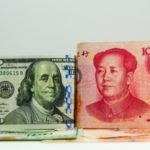A revolutionary book from China, where it became a bestseller and is hushed up in Europe for (un)known reasons
Did you know that the FED is actually a private bank and still has the right to issue dollars? Did you know that for over 200 years private bankers have been controlling inflation and deflation, causing crises and even determining world history? Or do you really believe that history is a chaotic process, a melting pot of coincidences, independent decisions by politicians, insane ideologies and carefully planned strategies? Consider the crises in South Korea (1997), Argentina (1998-2002), Greece (2009) and many others in modern world history. Who did the citizens of the affected countries blame for the crisis? Not only their government, but also the international bankers, for whom the governments of the countries affected by the crisis were only a springboard. Would you like to know how these bankers manage to be so powerful and control demand for money almost everywhere in the world and thus control societies? It’s not that complicated and you don’t have to know anything about the economy: just read “Currency Wars” by Song Hongbing.
It is not a novelty (already published in 2006), but it throws a whole new light on the issues that are tricky today: Currency wars and financial crises. Everyone is asking today: will the yuan strengthen and the dollar weaken? What about the euro? Lagard’s election of the head of the ECB has buried the hope for a stronger euro that was associated with the candidacy of Weidmann – a well-known hawk in financial policies. If she continues to weaken the euro in this way, will interest rates in the euro zone slide so low that pensioners and savers will slowly but surely lose their money? Probably. It’s time for “shearing sheep” as Song Hongbing calls such moments in history (crises, expropriations, etc.). We, the people, are these sheep.
Everyone is asking today: why is there another crisis in Argentina? Why are Italian banks burdened with so many bad loans? Has Greece really been rescued from the crisis by the IMF and Troika? Or are the bombs still ticking everywhere? Some of the Chinese author’s and financial specialist’s critics have dismissed him as a proponent of conspiracy theories, but nowhere in his book do you find a place where he simplifies history, or analyses it from a single point of view (as conspiracy theorists usually do). No, he cites numerous examples from the past and reveals facts that have been and are concealed or swept under the carpet by official propaganda and mainstream media. An example: American presidents. Kennedy – a favourite child of conspiracy theorists. Why was he murdered? And why were there assassinations on Reagan?
The whole story began at Lincoln’s time. Since the discovery of gold deposits in the western United States, the country became independent from the financing of Western European bankers, as the American government was able to control demand for gold independently. Lincoln, whose government began to issue its own currency, added the Greenback, with which he could finance the war and halt the recession. Bismarck said, “Lincoln was approved by Congress to obtain the necessary credit by issuing the government’s bonds. In this way, the government and the country have escaped the trap of foreign bankers. When they realized that America was freeing itself from its shackles, the days of Lincoln were numbered.”1)“Currency Wars”, Song Hongbing, 2006, p.55.In fact, Lincoln was shot in April 1865.
Other presidents who took action against fiat money of the central and private banks and wanted to give the money back its value through gold or silver parity were just as badly off. In June 1963 Kennedy stopped the sale of the silver reserves by the United States Department of the Treasury with his decree no. 11110. In November of the same year he was already dead. In June 1981, when Reagan took office, he asked Congress to review the possibility of returning to the gold standard. He was shot in March of the same year. As the king of bankers, Amschel Meyer Rothschild, put it: “Give me control over a nation’s currency, and I don’t care who makes the laws.”
Rothschilds run like a red thread through Hongbing’s book and perhaps that’s why he was accused of anti-Semitism. He himself said, “The Chinese think Jews are rich and clever, so we should learn from them.2)Antisemitisches Wirtschaftsbuch wird Bestseller in China, Spiegel 2007-09-27.His book was merely intended as a warning for China not to fall into the trap of Western bankers. One problem with Song Hongbing’s critics is that the book has not been translated into English or German. Did they really read it in French or Polish (available editions in the European languages)? Or do they write their criticism on behalf of…? Well? By the way: none of the other 4 parts of “Currency Wars” published until 2018 was translated or published in Germany, Great Britain or the USA. A conspiracy against the author?
Do you know who’s richest in the world? Bill Gates, Warren Buffet, Prince of Saudi Arabia? Not at all! The Rothschild’s family fortune is estimated at 2 000 000 000 000 (2 trillion dollars).3)Das unglaublich Vermögen der Familie Rotschild, Vermögenmagazin 2019-03-11.Conspiracy theory. No, a fact. “Currency Wars” contains carefully researched facts from history and the financial world. Incredible stories are told with a lively, clear language. Through a broad perspective, well-founded theoretical foundations and the complexity of the points of connection between bankers, politicians and corporations, the author creates a three-dimensional image. An image that is worth looking at. Recommended reading.
Song Hongbing, „Currency Wars“, 2007, CITIC Press Corporation
References
| 1. | ↑ | “Currency Wars”, Song Hongbing, 2006, p.55. |
| 2. | ↑ | Antisemitisches Wirtschaftsbuch wird Bestseller in China, Spiegel 2007-09-27. |
| 3. | ↑ | Das unglaublich Vermögen der Familie Rotschild, Vermögenmagazin 2019-03-11. |




